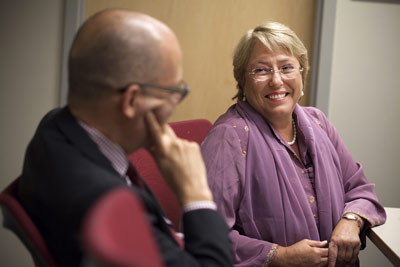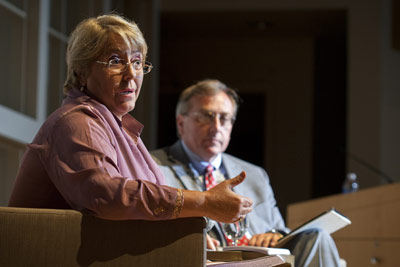Bartels lecturer examines status of women worldwide
By Steven Mark

Michelle Bachelet, a physician and surgeon who served as president of Chile 2006-10, stressed that women's issues are not solely for those with two X chromosomes and called on all people to take a stand and try to make a difference in their own government. The burden should fall equally on everyone, including "men who are gender sensitive and believe in gender equality," she said.
Her talk, the Henry E. and Nancy Horton Bartels 2012 World Affairs Fellowship Lecture, was on "Women and the New Development Paradigm." She drew a capacity crowd to Statler Auditorium Sept. 4, while others watched on a monitor in an overflow room.
Bachelet is executive director of the United Nations Entity for Gender Equality and the Empowerment of Women (UN Women), which works with governments, civil society and the private sector to advance women's empowerment and gender equality worldwide. As president during the worldwide financial crisis, Bachelet spent billions on pension reform, social protection programs for women and children, and research and development.
In her introduction, Bachelet noted the groundbreaking work of Cornell on the empowerment of women. Citing the first woman to matriculate at Cornell, Jennie Spencer, Class of 1870, who graduated 50 years before American women had the right to vote, Bachelet said: "She was literally taking an historic step forward."
Bachelet said that a new development paradigm was needed to implement policies and reforms that promote gender equality.

She advocates ways to put more women into positions of power, such as quotas for seats in parliament or congress and requiring political parties to list an equal amount of men and women on their ballots. In reference to the Arab Spring, Bachelet talked about the importance of social media and the Internet as new technologies accessible to all people that have changed the way political movements take shape.
Turning to women's control over their bodies, Bachelet said the world's increasing population leads to poverty and scarcity of resources. This is due in part because women are denied access to contraception and education about family planning, which would counteract these problems. "That the right of a woman to decide if and when and how many children she wants to have is still up for debate is a sign of the work that still lies ahead of us," Bachelet said, noting that this work is also necessary in the United States.
The Henry E. and Nancy Horton Bartels World Affairs Fellowship was established in 1984 to bring prominent international leaders to Cornell. The fellowship program, administered by the Mario Einaudi Center for International Studies, brings distinguished international public figures to foster a broadened worldview among Cornell students.
Law student Steven Mark is a writer intern for the Cornell Chronicle.
Media Contact
Get Cornell news delivered right to your inbox.
Subscribe